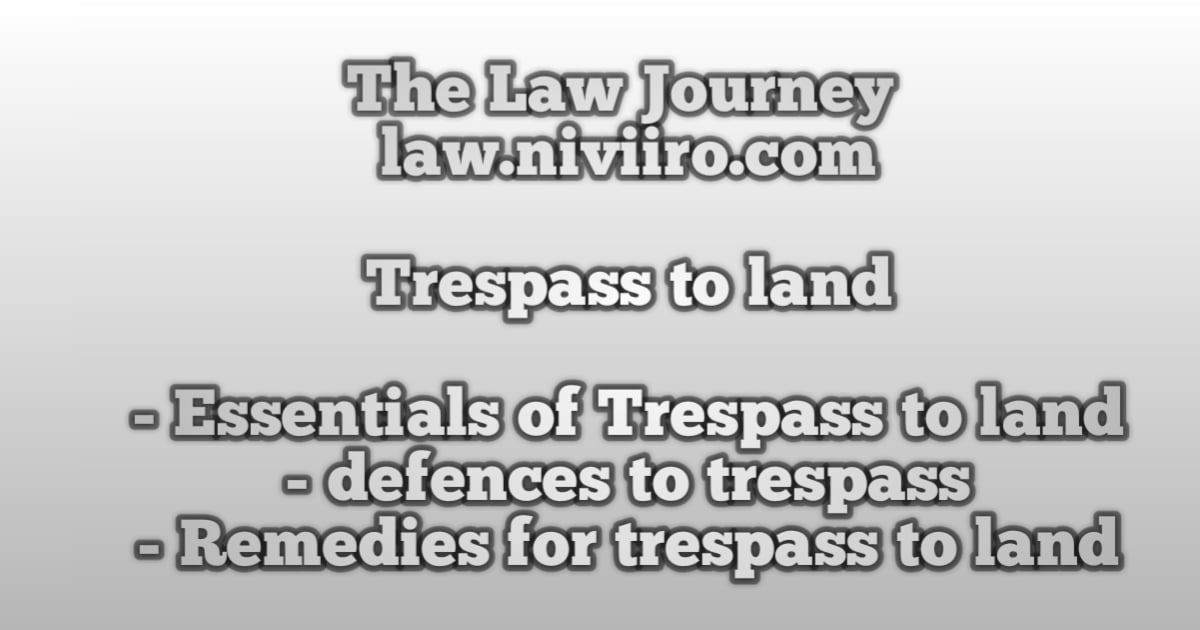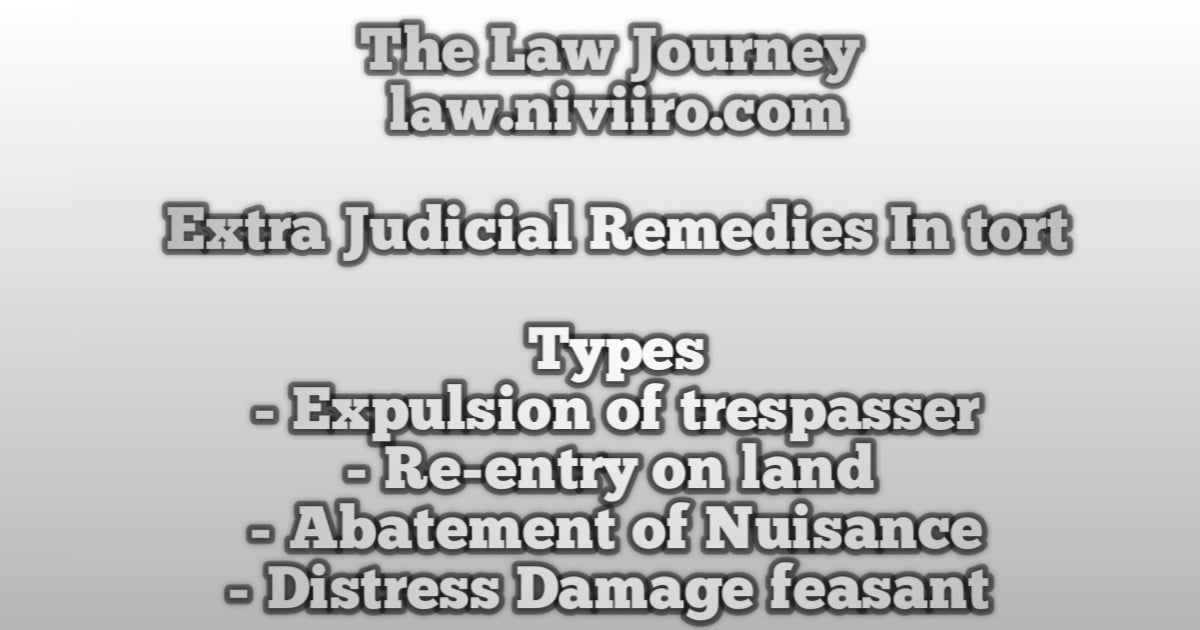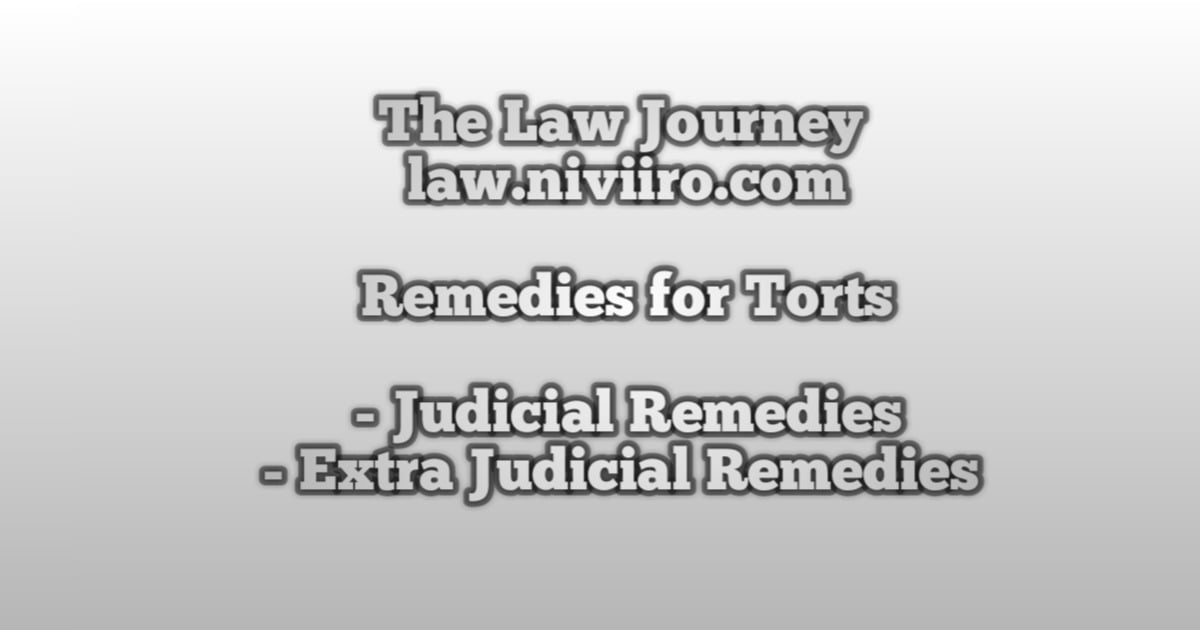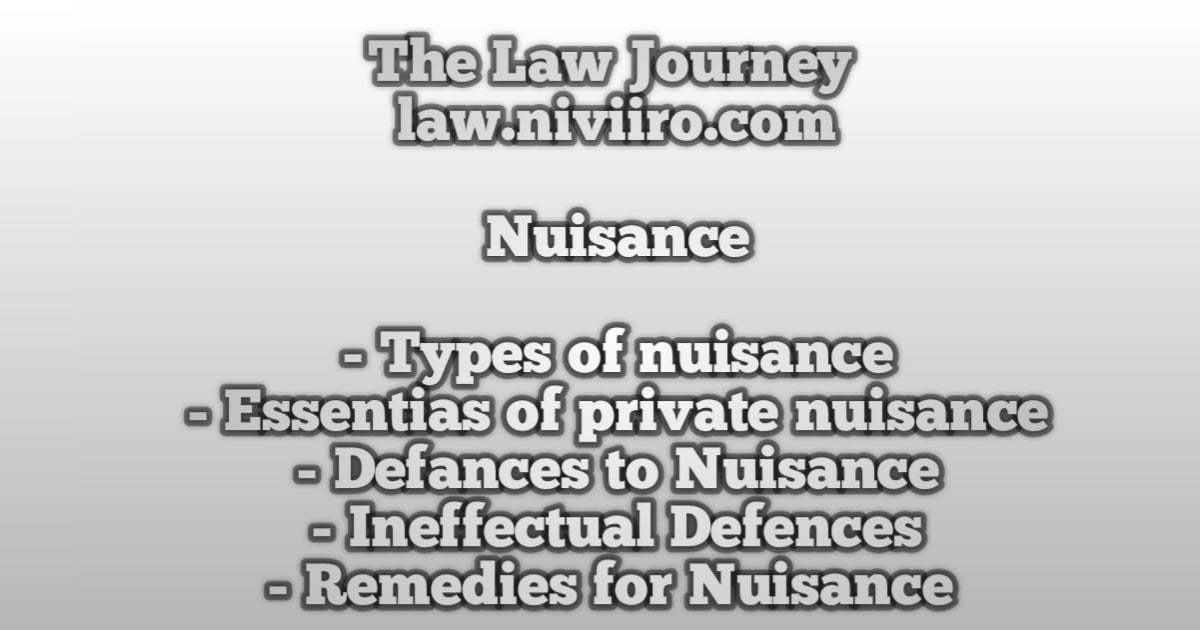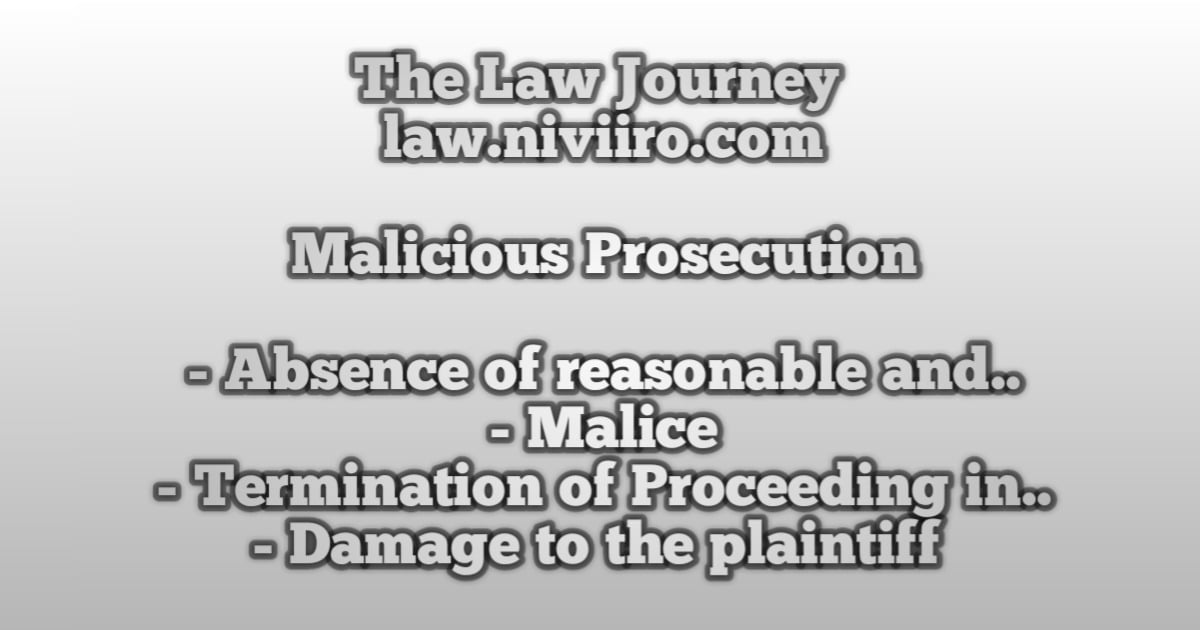Meaning of Trespass to land in tort – Any interference with the possession of land without lawful justification will constitute a tort of trespass to land.
Definition : Trespass to land is the unjustifiable interference with the possession of land. (Winfield)
Essentials of Trespass to Land
There are mainly two essentials of Trespass to Land. that are ;
(i)Land must be in possession of plaintiff, (ii)Unauthorised Entry.
Land must be in possession of plaintiff
It is proof of ownership and consists of two components: Animus and Corpus; Animus is the mental element and Corpus is the physical element. The individual in possession of land does not have to be the owner; he just has the right to enjoy the property in peace and quiet. He has the right to exclude everyone else.
Trespass occurs when A accesses the territory of ‘B,’ lingers there, or performs any act affecting B’s possession without legal authorization. It is not required for him to use force and inflict damage to B’s land. Indeed, as Chief Justice Holt stated, “any breach of private property, no matter how little, is trespass.” (Entinck V. Corrington)
Unauthorised Entry
Trespass is defined as any interference without legal authorization or reason, such as placing any chattel on B’s land, planting trees on that land, shooting over that land, causing any noxious chemical to traverse the land, establishing a structure overhanging that land, and so on. Even the airspace above the land belongs to the landowner, and any unlawful entrance is considered trespass. Animals may commit trespass. The animal’s owner is liable.
Trespass ab initio
Trespass ab intio means trespass from the beginning, This is a circumstance where the entry of a person on the land of another is lawful, but if the person stays and abuses his authority he becomes a trespasser ab intio. It is important that the person must abuse his possession by doing some positive act and not by a mere omission.
Dais V. Pasmore: In this instance, the police were called to P’s home in order to arrest P and others. They seized certain papers that were pertinent to the accused person’s prosecution; they also seized other documents that they later returned. It was determined that the police officers were accountable for trespass from the start in relation to papers collected and returned. They were not, however, liable for entering the premises to arrest P and others.
Chic Fashins v. Jones: Under a search warrant, police officers entered P’s business to hunt for stolen products. They didn’t find any, but they did find a few others that they took. They had fairly and incorrectly assumed that the seized items were stolen. Held, the seizure was not illegal. The doctrine of trespass ab initio was not raised.
Entry with Licence
Licence means authority granted and entry with licence means to enter some premises for which the person has been authorized by the one who has got the possession of the said premises.
According to section 52 of the Indian Easements Act, 1882 Licence means – “Where one person grants to another, or to a definite number of persons a right to do, or continue to do, in or upon the immovable property of the granter, something which would, in the absence of such right, be unlawful, and such right does not amount to an easement or on interest in property, the right is called a licence.” To permit a person to demolish an old house is an example of licence. After the licence is revoked, the licensee must quit the place within reasonable time. If he does not do so, he will become a trespasser.
In Hurst v. Picture Theatres Ltd., (1915) 1 KB 1, Mr. Hurst purchased a ticket to watch a movie show at defendant’s theatre. He went inside the theatre and took the seat but he was forcibly taken out of the theatre. He sued for assault and the Court awarded damages. It was the observation of Buckley, L.J., that right to go into the theatre was a licence but right to see and enjoy the movie from beginning to end is a grant. So, it was a licence coupled with a grant.
Defences for Trespass
The various defences open to an action for trespass to land are briefly as follows:
- Right by prescription: The defendant must establish his right earned by prescription.
- leave and Licence: The entry may be under permission expressly or by implication.
- Authority of law : The entry may be according to law as in cases of entry for attachment of property under the orders of the ourt.
- Self defence : This is a general defence and must be proved.
- Re-entry on land: A person who is wrongfully dispossessed may enter peaceably and without using force.
- Abating a Nuisance: To remove a nuisance, entry on the land is justified.
- Entry to protect an easementary right.
Remedies for Trespass to land
These remedies are available for Trespass to land.
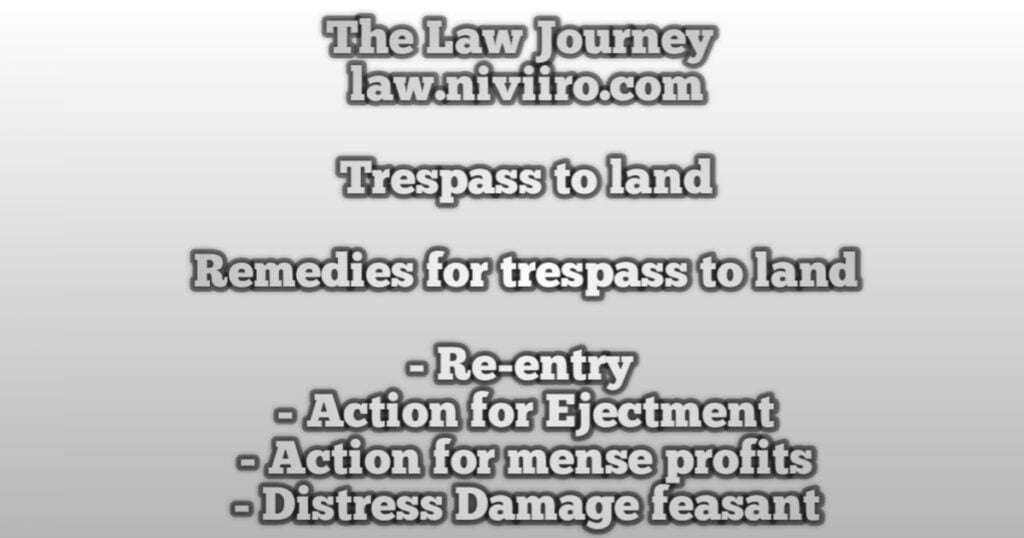
Re-entry
The person with possession has the right to enter or reenter the property in a peaceful way. As a result, a trespasser who is forced to leave the premises with reasonable force cannot sue the person who was legitimately entitled to his land.[Hemmings v Stoke Poges Golf Club (1920) 1 KB 720].
Action for Ejectment
A person in lawful possession who is evicted from specific immovable property without due process of law may reclaim the property by bringing a suit within 6 months after his eviction. The title to the property is not examined in such a litigation, because even a person claiming a superior title has no power to evict another person without due process of law (Sec. 6, Specific Relief Act, 1963). However, because a trespasser is not a person in possession, he or she cannot invoke this rule.
However, in the end, the plaintiff must recover based on the strength of his own title, not the defendant’s title. Further, if the evidence shows that some third person is entitled to the land, the plaintiff ought not to succeed and the defendant ought to be allowed to plead jus tertii (title of third person).
Action for mense profits
Apart from the right of recovery of land by getting the trespasser ejected a person who was wrongly dispossessed of his land may also claim compensation for the loss which he has suffered during the period of dispossession. ‘Mense profits’ refers to the profits taken by the defendant during the period of his occupancy.
Distress damage Feasant
This right authorises a person in possession of land to seize the trespassing cattle or other chattels. He can detain them until compensation has been paid to him for the damage done.
Related Post
Define ‘Trespass to Land’ ?
Meaning of Trespass to land – Any interference with the possession of land without lawful justification will constitute a tort of trespass to land.
Definition : Trespass to land is the unjustifiable interference with the possession of land. (Winfield)
What are the Essentials of Trespass to Land ?
There are mainly two essentials of Trespass to Land. that are ;
(i)Land must be in possession of plaintiff, (ii)Unauthorised Entry.
What do you mean by ‘Trespass ab initio’ ?
Trespass ab intio means trespass from the beginning, This is a circumstance where the entry of a person on the land of another is lawful, but if the person stays and abuses his authority he becomes a trespasser ab intio. It is important that the person must abuse his possession by doing some positive act and not by a mere omission.
Meaning of ‘Entry with Licence’ ?
Licence means authority granted and entry with licence means to enter some premises for which the person has been authorized by the one who has got the possession of the said premises.
Remedies for Trespass to land ?
These remedies are available for Trespass to land.
1. Re-entry, 2. Action for ejectment, 3. Action for mense profits, 4. Distress damage Feasant.
Reference
- P.S.A. Pillai’s – Law Of Tort
- Law of Torts by J.N. Pandey
- Law of Torts by Ratanlal and Dhirajlal
- Law of Torts by RK Bangia (22nd Edition)
- Universals Law of Torts
- A.K Jain law of torts













